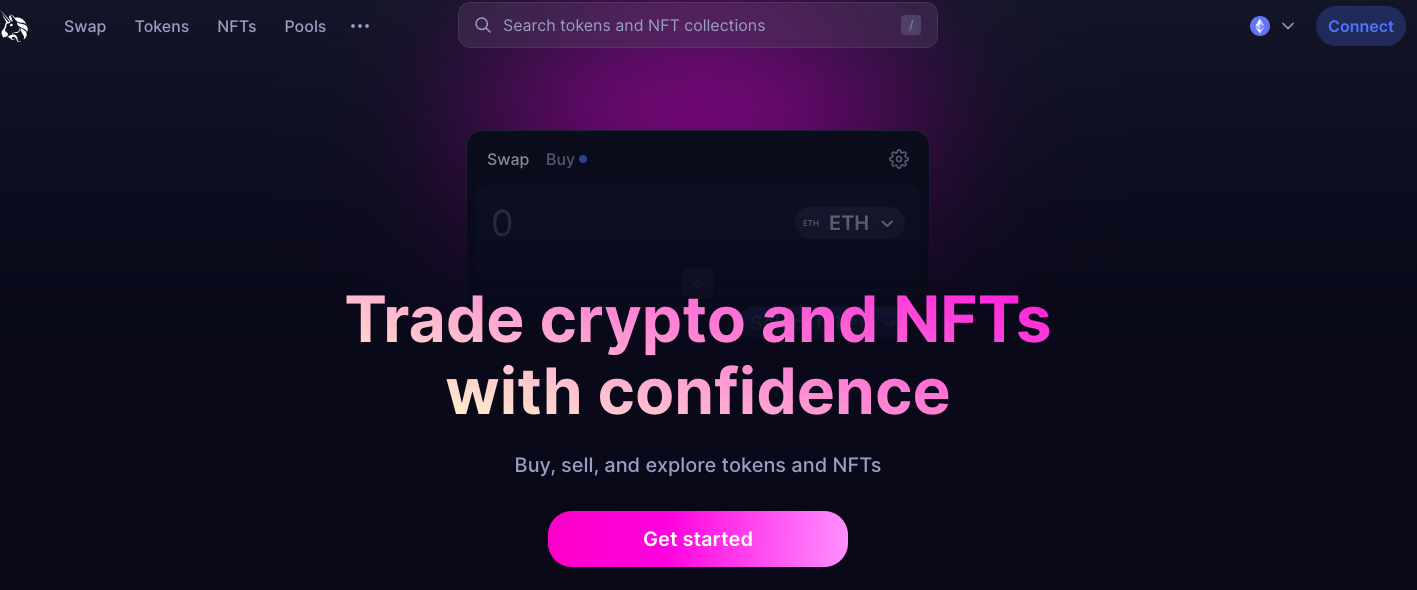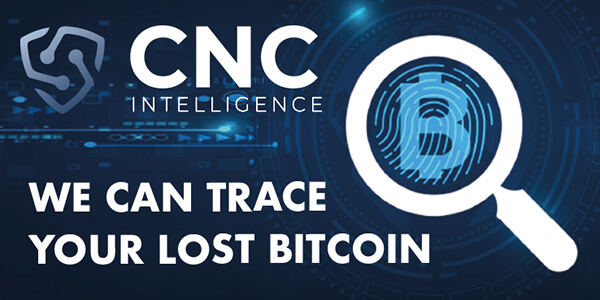In the dynamic realm of cryptocurrencies, decentralized exchanges are rapidly gaining popularity for their innovative approach. Among the leading DEX platforms, Uniswap stands out as a game-changer. Since its inception in 2018, it has revolutionized how users trade and interact with Ethereum-based tokens.
In this article, we will explore the ins and outs of the website, including its defining characteristics, unique features, advantages, drawbacks, fee structure, and customer reviews. Join us as we delve into the world of Uniswap and uncover why it has become a go-to platform for decentralized trading.

What is Uniswap?
Uniswap is a decentralized exchange that allows users to trade Ethereum-based tokens directly from their wallets. It operates on automated market making, eliminating the need for a traditional order book. Uniswap utilizes liquidity pools, which are constantly updated and provided by users who earn fees for their contributions. Founded by Hayden Adams, Uniswap gained popularity for its simplicity and user-friendly interface.
Features
Uniswap sets itself apart from the competition with its groundbreaking features redefining decentralized exchanges. Let’s explore these distinctive traits that have propelled this platform to the forefront of the industry:
- Automated Market Making: Uniswap’s pioneering trading model eliminates the need for a centralized order book. Instead, it relies on automated market making, which allows users to trade tokens directly from liquidity pools. This innovative approach ensures continuous liquidity and enables efficient token swaps.
- Extensive Token Variety: It supports a wide range of Ethereum-based tokens. This expansive token selection provides users unparalleled access to diverse trading options, enhancing flexibility and market opportunities.
- User-Friendly Interface: The platform is designed with simplicity and accessibility in mind. Its user-friendly interface caters to new and experienced traders, allowing seamless navigation and efficient execution of trades. The intuitive design promotes a hassle-free trading experience for all users.
- Decentralization at its Core: Operating as a decentralized exchange, it operates without the involvement of intermediaries or central authorities. This decentralized nature ensures that users retain complete control over their assets throughout trading, enhancing security and trust.
- Open Source Transparency: Uniswap’s commitment to transparency is reflected in its open-source code. This transparency empowers the community to audit and verify the platform’s functionality, fostering user trust.
- Initial Liquidity Offerings (ILOs): The website has become a preferred platform for conducting Initial Liquidity Offerings. This feature enables projects to raise funds and establish token liquidity without traditional Initial Coin Offerings. It promotes a fair and accessible fundraising mechanism for both projects and investors.
- Competitive Fee Structure: The fee structure is designed to be reasonable and competitive compared to other decentralized exchanges. The fees, typically set at 0.3% per trade, ensure that liquidity providers receive fair compensation for their contributions while offering cost-effective trading for users.
- High Liquidity: It boasts a substantial and growing liquidity pool. This high liquidity allows users to execute trades of varying sizes without significantly impacting market prices or experiencing slippage.
Uniswap Fee Structure
Understanding the fee structure of a decentralized exchange like Uniswap is essential for users to make informed decisions.
- Trading Fees: Uniswap implements a simple and transparent trading fee structure. A standard fee of 0.30% is charged for each trade executed on the platform. This fee is automatically deducted from the total amount of tokens being swapped. For example, if you were to trade 1 ETH for another token, the trading fee would be 0.30% of the value of 1 ETH.
- Liquidity Provider Fees: Liquidity providers play a crucial role in its ecosystem by contributing assets to the liquidity pools. In return for their contributions, they receive a portion of the trading fees generated by the platform. The fee distribution to liquidity providers is proportional to their share of the liquidity pool. The more liquidity a provider contributes, the higher their potential fee earnings.
- Gas Fees: Gas fees are a separate component of the fee structure on Uniswap. Gas fees are the transaction fees paid to Ethereum miners for processing and validating transactions on the blockchain. As Uniswap operates on the Ethereum network, users must pay gas fees for every transaction they initiate, including trades on the platform. Gas fees are calculated based on the complexity and computational resources required for a transaction and can vary depending on network congestion.
Pros and Cons of Uniswap
Pros:
- A decentralized nature ensures user control and trustless transactions.
- A wide variety of tokens and trading options are available.
- Simple and user-friendly interface suitable for both beginners and experienced traders.
- Low fees compared to centralized exchanges.
- High liquidity for efficient trading.
Cons:
- The learning curve associated with the user interface.
- Limited mobile app availability, currently only on the Apple App Store.
Uniswap Customer Reviews
Customer reviews of Uniswap reflect mixed sentiments regarding the platform’s performance and features. Positive reviews highlight the ease of use, extensive token selection, and decentralized nature of Uniswap. Users appreciate the simplicity and user-friendly interface, which allow them to engage in decentralized trading without intermediaries or KYC requirements. The platform’s open-source code also instills confidence, as users can audit and verify its functionality.
However, negative reviews focus on specific concerns such as price volatility, limited customer support, and potential risks associated with fraudulent tokens. Some users have experienced sudden slippage and price fluctuations during periods of high market volatility, which affected their trading outcomes.
Get in touch with our affiliated Cryptocurrency Forensic Specialists at CNC Intelligence for free by filling out the form below.
The lack of dedicated customer support is a drawback, as users may face difficulties resolving issues or obtaining personalized assistance. Additionally, Uniswap’s decentralized nature exposes users to the risk of encountering scams or low-quality tokens, emphasizing the importance of conducting thorough research before engaging in trades.
Uniswap Scams
Cryptocurrency scams are evolving, and one of the latest fraud tactics involves using fake websites to mimic legitimate platforms like Uniswap.
This type of phishing scam aims to steal your funds by tricking you into thinking you are using the real Uniswap platform.
Below is a detailed explanation of how this scam works and tips to protect yourself.
What is the Uniswap Phishing Scam?
In this scam, unsuspecting users intending to use the decentralized exchange Uniswap may accidentally land on a fraudulent website that closely mimics the official uniswap.org platform.
These fake websites, such as uniswanp.org, are designed to deceive users into thinking they are performing legitimate cryptocurrency transactions.
Complaints We Received
One victim, intending to purchase Wolverinu Coin, accessed what they believed to be the actual Uniswap website through their Coinbase Wallet.
However, they were instead directed to the phishing site uniswanp.org.
After completing the transaction, the victim checked their Coinbase wallet and realized that the purchased coins had never appeared, confirming that they had been scammed.
Another victim fell prey to a similar phishing scam while attempting to perform a swap on Uniswap. In this case, the victim was directed to a fraudulent website posing as Uniswap at uniswap-v3.org-community-referral.tech, which resembled the legitimate decentralized exchange platform. The victim intended to swap his USDT (Tether) for AAVE tokens but was deceived into using this phishing site.
After completing the transaction, the victim realized that his funds, amounting to $6,438.01, had been stolen. The transaction was recorded on PolygonScan (Transaction ID: 0xf5eed0b80cadfae4da519834fb0906aba471724f3c456f67f2498767220325d9), but no AAVE tokens were received. The phishing site successfully stole the USDT, leaving the victim without any recourse for the funds.
After realizing the scam, the victim reached out for help, explaining that the phishing link led him to this fake Uniswap page. He had used the phishing site through his Coinbase Wallet to execute the transaction. Like the previous case, this incident showcases how phishing sites can manipulate users by mimicking legitimate services with near-identical URLs designed to steal cryptocurrency during swaps or token purchases.
Another victim fell prey to an elaborate investment scam involving a fraudulent platform posing as Uniswap. The victim began by investing $2,000 in Tether (USDT) through crypto.com and was then guided to transfer the funds to what appeared to be Uniswap. They were encouraged to trade daily for about a month, gradually increasing their investment to $7,000.
The platform promised significant returns, and by the end of the month, the victim’s account balance allegedly grew to $212,000. However, when attempting to cash out, the platform demanded a 20% tax payment on the total amount, approximately $45,000, before releasing the funds. This raised suspicion, as legitimate platforms automatically handle taxes during transactions. Upon refusing to pay the tax, the victim discovered that the trading platform had disappeared, losing access to their account and funds.
Another victim was targeted in a sweeper scam involving cryptocurrency and NFTs linked to a Uniswap Liquidity Pool. Without sharing their private key or confirming any transactions, the victim experienced the sudden unauthorized transfer of all their funds to multiple wallets. The victim’s NFT, which grants ownership over the Uniswap Liquidity Pool, was also stolen, leaving their funds inaccessible.
Key Details:
- Scam Name: Sweeper Scam
- Transaction Hash: The unauthorized transaction occurred under the hash 0x8e7d63ffdd22ef315cc34228accf1cfef2590258a5e4ae55591155e2eb605b60.
- Receiving Address: The funds were directed to 0x90fba317634F4cBd99Dba804D8d4be583126606B.
The victim highlighted that they never shared their private key nor approved any transaction, which suggests that their wallet may have been compromised through some malicious tactic or vulnerability in the platform used to manage their assets.
On October 24, 2023, one of our partners received the following complaint from a person who reported being scammed for somewhere between 1.5K and 12K:
Yes, on September 20, 2020, the decentralized platform Uniswap announced an airdrop of their Uniswap token. Anyone who interacted with their platform before this date could claim their native Uniswap token, receiving 400 UNI for any wallet that interacted with it. I had multiple wallets and claimed the first one on September 22, 2022. However, when I went to claim the other wallet, someone had already claimed the 400 Uniswap tokens. I reported this to Uniswap and posted it in the forums but received no replies until this year.
A supposed Uniswap developer, hired by Uniswap themselves, decided to help me recover the stolen claim. I had a detailed conversation with them throughout the whole process. I eventually provided them with the address of my wallet. They sent me a link to claim my recovered 400 Uniswap tokens a few days later. When I clicked the link, the first thing that came up was “connect your wallet,” which immediately made me realize it was a scam.
I have traced the transactions, and they traded these Uniswap tokens for USDT and then sent them to Binance. I spoke to Binance, and being from the USA, they tried to manipulate me for answers and subsequently blocked me. This process was illegal. I have all the information and accurate data to prove that the person who did this unlawfully claimed the wallet as mine.
I reported this to the digital wallet developer, with emails as proof. At the time, I could have traded these tokens for nearly $15,000, and this is what I am currently pursuing. I also have viable information about who stole and sold these tokens. This has been determined by researching and tracking the wallet address, as well as the Ethereum address of the wallet owner.
Another victim fell prey to a cryptocurrency scam involving a fraudulent Uniswap hack. After performing transactions involving $208,000 worth of cryptocurrency, the victim realized that their funds were stolen and filed a case to recover their lost assets. The scam occurred when the victim was using Uniswap, a decentralized platform, where three transactions took place, resulting in a total loss of $208,194.
The case involved a Uniswap hack where funds were misappropriated from the victim’s account.
Conclusion
Ultimately, whether Uniswap is the right choice depends on individual requirements and risk tolerance. Traders looking for a decentralized and user-friendly platform to trade Ethereum-based tokens may find Uniswap appealing. However, it’s crucial to conduct thorough research, exercise caution, and be aware of the risks associated with decentralized exchanges.
As the cryptocurrency landscape continues to evolve, decentralized exchanges like Uniswap are becoming more prominent alternatives to centralized exchanges. With ongoing developments and improvements, Uniswap has the potential to solidify further its position as a leading DEX in the market.
If you have fallen victim to online scams, please comment below. If you have suffered a substantial financial loss, do not despair. We are here to assist you in recovering your funds!
When you comment, your name, comment, and the timestamp will be public. We also store this data, which may be used for research or content creation in accordance with our Privacy Policy. By commenting, you consent to these terms.

